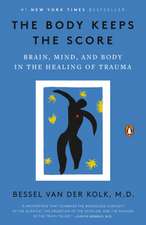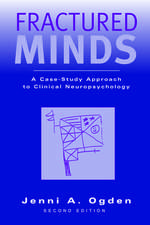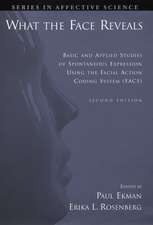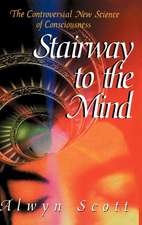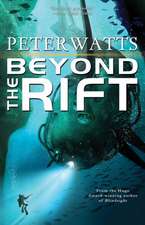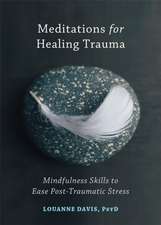Consciousness: Creeping up on the hard problem
Autor Jeffrey Grayen Limba Engleză Paperback – 30 noi 2006
Preț: 409.05 lei
Preț vechi: 520.28 lei
-21% Nou
Puncte Express: 614
Preț estimativ în valută:
78.27€ • 83.70$ • 65.26£
78.27€ • 83.70$ • 65.26£
Carte tipărită la comandă
Livrare economică 07-14 aprilie
Preluare comenzi: 021 569.72.76
Specificații
ISBN-13: 9780198520917
ISBN-10: 0198520913
Pagini: 368
Ilustrații: 58 black & white photographs and 15 colour plates
Dimensiuni: 156 x 233 x 19 mm
Greutate: 0.6 kg
Ediția:Revised
Editura: OUP OXFORD
Colecția OUP Oxford
Locul publicării:Oxford, United Kingdom
ISBN-10: 0198520913
Pagini: 368
Ilustrații: 58 black & white photographs and 15 colour plates
Dimensiuni: 156 x 233 x 19 mm
Greutate: 0.6 kg
Ediția:Revised
Editura: OUP OXFORD
Colecția OUP Oxford
Locul publicării:Oxford, United Kingdom
Recenzii
An excellent overview that touches expertly on the many biological and psychological features underlying the consciouse experience.
In many ways the book is a tour de force, reflecting not just Gray's sensitive understanding of and extensive research in neuroscience, but unusually for a neuroscientist, a relatively sophisticated understanding of the philosophical issues surrounding consciousness as well... a fine thoughtful book. It is leading edge, engagingly written in a way that both students and researchers will appreciate, and forms a fitting testament to his searching intellectual life.
A well-written, thoroughly researched investigation... a significant piece of scholarship. Throughout, Gray presents complicated philosophical and neurobiological issues in a logical and coherent manner, and he clears the ground for other scientists to propose solutions to the hard problem of consciousness. Jeffrey Gray passed away in April 2004. This book is a testament to his intellectual giftedness, energy, and enormous talent.
... will be enjoyed by everyone interested in consciousness. Gray, a neuropsychologist, eloquently summarizes significant experimental results on consciousness and, more importantly, explains both how these results interrelate and how they constrain potential theories of consciousness. He also uses these results to build a novel, fascinating thoery of what consciousness does and does not do. Throughout the work Gray's accessible presentation remains deeply respectul of psychologists, neuroscientists, and philosopher's approaches to consciousness. In this repect, Gray's book is an ideal work for an interdisciplinary audience.
The late Professor Emeritus Jeffrey Gray is one to be remembered well. He is known for many things, including being of the most highly cited experimental psychologists in the UK to generating theories of human consciousness... This book is the culmination of Gray's long-standing quest for understanding the essential properties of consciousness... Gray's book is well worth the read. His coverage of models that address the hard problem of consciousness is reasonably complete. Gray is highly skilled at thoroughly critiquing each model (always finding both strengths and weaknesses). He gives the same constructive criticism to each model, in exactly the same measure he gives his own. His style is entirely fair-minded and refreshing... This is an excellent book that comes at the conclusion of the life of an outstanding member of academia. It is a timeless addition to any library for this reason alone.
Gray admits that reconciling a causal role for consciousness with the completeness of physics is difficult. I would say impossible. His book is unusual, though, in devoting considerable attention to the question of the efficacy of consciousness. Everyone who believes that continued research will throw light on the nature of consciousness including those who deny its causal efficacy can meanwhile acknowledge its supreme value and enjoy language and science and appreciate beauty.
...remarkable both for the clarity of its expositions, and for the patience with which he explores the prospects for integrating the hard problem into normal science.
In many ways the book is a tour de force, reflecting not just Gray's sensitive understanding of and extensive research in neuroscience, but unusually for a neuroscientist, a relatively sophisticated understanding of the philosophical issues surrounding consciousness as well... a fine thoughtful book. It is leading edge, engagingly written in a way that both students and researchers will appreciate, and forms a fitting testament to his searching intellectual life.
A well-written, thoroughly researched investigation... a significant piece of scholarship. Throughout, Gray presents complicated philosophical and neurobiological issues in a logical and coherent manner, and he clears the ground for other scientists to propose solutions to the hard problem of consciousness. Jeffrey Gray passed away in April 2004. This book is a testament to his intellectual giftedness, energy, and enormous talent.
... will be enjoyed by everyone interested in consciousness. Gray, a neuropsychologist, eloquently summarizes significant experimental results on consciousness and, more importantly, explains both how these results interrelate and how they constrain potential theories of consciousness. He also uses these results to build a novel, fascinating thoery of what consciousness does and does not do. Throughout the work Gray's accessible presentation remains deeply respectul of psychologists, neuroscientists, and philosopher's approaches to consciousness. In this repect, Gray's book is an ideal work for an interdisciplinary audience.
The late Professor Emeritus Jeffrey Gray is one to be remembered well. He is known for many things, including being of the most highly cited experimental psychologists in the UK to generating theories of human consciousness... This book is the culmination of Gray's long-standing quest for understanding the essential properties of consciousness... Gray's book is well worth the read. His coverage of models that address the hard problem of consciousness is reasonably complete. Gray is highly skilled at thoroughly critiquing each model (always finding both strengths and weaknesses). He gives the same constructive criticism to each model, in exactly the same measure he gives his own. His style is entirely fair-minded and refreshing... This is an excellent book that comes at the conclusion of the life of an outstanding member of academia. It is a timeless addition to any library for this reason alone.
Gray admits that reconciling a causal role for consciousness with the completeness of physics is difficult. I would say impossible. His book is unusual, though, in devoting considerable attention to the question of the efficacy of consciousness. Everyone who believes that continued research will throw light on the nature of consciousness including those who deny its causal efficacy can meanwhile acknowledge its supreme value and enjoy language and science and appreciate beauty.
...remarkable both for the clarity of its expositions, and for the patience with which he explores the prospects for integrating the hard problem into normal science.

